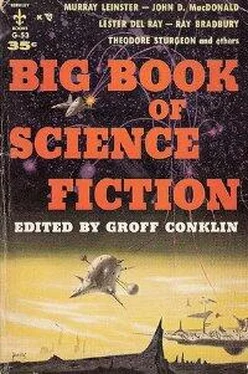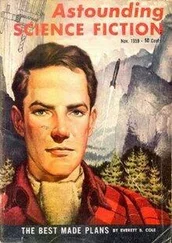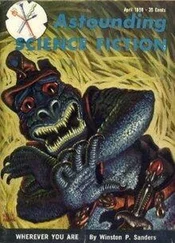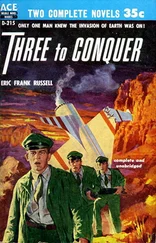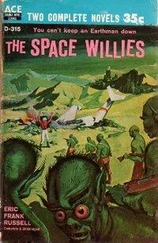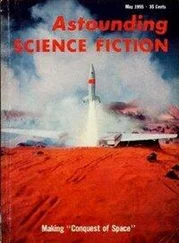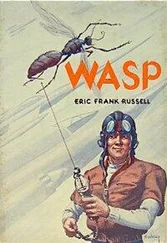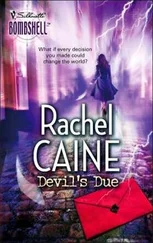Dear Devil
by Eric Frank Russell
The first Martian vessel descended upon Earth with the slow, stately fall of a grounded balloon. It did resemble a large balloon in that it was spherical and had a strange buoyance out of keeping with its metallic construction. Beyond this superficial appearance all similarity to anything Terrestrial ceased.
There were no rockets, no crimson Venturis, no external projections other than several solaradiant distorting grids which boosted the ship in any desired direction through the cosmic field. There were no observation ports. All viewing was done through a transparent band running right around the fat belly of the sphere. The bluish, nightmarish crew was assembled behind that band, surveying the world with great multifaceted eyes.
They gazed through the band in utter silence as they examined this world which was Terra. Even if they had been capable of speech they would have said nothing. But none among them had a talkative faculty in any sonic sense. At this quiet moment none needed it.
The scene outside was one of untrammeled desolation. Scraggy blue-green grass clung to tired ground right away to the horizon scarred by ragged mountains. Dismal bushes struggled for life here and there, some with the pathetic air of striving to become trees as once their ancestors had been. To the right, a long, straight scar through the grass betrayed the sterile lumpiness of rocks at odd places. Too rugged and too narrow ever to have been a road, it suggested no more than the desiccating remnants of a long-gone wall. And over all this loomed a ghastly sky.
Captain Skhiva eyed his crew, spoke to them with his sign-talking tentacle. The alternative was contact-telepathy which required physical touch.
“It is obvious that we are out of luck. We could have done no worse had we landed on the empty satellite. However, it is safe to go out. Anyone who wishes to explore a little while may do so.”
One of them gesticulated back at him. “Captain, don’t you wish to be the first to step upon this world?”
“It is of no consequence. If anyone deems it an honor, he is welcome to it.” He pulled the lever opening both air-lock doors. Thicker, heavier ah- crowded in and pressure went up a little. “Beware of overexertion,” he warned as they went out.
Poet Pander touched him, tentacles tip to tip as he sent his thoughts racing through their nerve ends. “This confirms all that we saw as we approached. A stricken planet far gone in its death throes. What do you suppose caused it?”
“I have not the remotest idea. I would like to know. If it has been smitten by natural forces, what might they do to Mars?” His troubled mind sent its throb of worry up Pander’s contacting tentacle. “A pity that this planet had not been farther out instead of closer in; we might then have observed the preceding phenomena from the surface of Mars. It is so difficult properly to view this one against the Sun.”
“That applies still more to the next world, the misty one,” observed Poet Pander.
“I know it. I am beginning to fear what we may find there. If it proves to be equally dead, then we are stalled until we can make the big jump outward.”
“Which won’t be in our lifetimes.”
“I doubt it,” agreed Captain Skhiva. “We might move fast with the help of friends. We shall be slow—alone.” He turned to watch his crew writhing in various directions across the grim landscape. “They find it good to be on firm ground. But what is a world without life and beauty? In a short time they will grow tired of it.”
Pander said thoughtfully, “Nevertheless, I would like to see more of it. May I take out the lifeboat?”
“You are a songbird, not a pilot,” reproved Captain Skhiva. “Your function is to maintain morale by entertaining us, not to roam around in a lifeboat.”
“But I know how to handle it. Every one of us was trained to handle it. Let me take it that I may see more.”
“Haven’t we seen enough, even before we landed? What else is there to see? Cracked and distorted roads about to dissolve into nothingness. Ages-old cities, torn and broken, crumbling into dust. Shattered mountains and charred forests and craters little smaller than those upon the Moon. No sign of any superior lifeform still surviving. Only the grass, the shrubs, and various animals, two- or four-legged, that flee at our approach. Why do you wish to see more?”
“There is poetry even in death,” said Fander.
“Even so, it remains repulsive.” Skhiva gave a little shiver. “All right. Take the lifeboat. Who am I to question the weird workings of the nontechnical mind?”
“Thank you, Captain.”
“It is nothing. See that you are back by dusk.” Breaking contact, he went to the lock, curled snakishly on its outer rim and brooded, still without bothering to touch the new world. So much attempted, so much done—for so poor reward.
He was still pondering it when the lifeboat soared out of its lock. Expressionlessly, his multifaceted eyes watched the energized grids change angle as the boat swung into a curve and floated away like a little bubble. Skhiva was sensitive to futility.
The crew came back well before darkness. A few hours were enough. Just grass and shrubs and child-trees straining to grow up. One had discovered a grassless oblong that once might have been the site of a dwelling. He brought back a small piece of its foundation, a lump of perished concrete which Skhiva put by for later analysis.
Another had found a small, brown, six-legged insect, but his nerve ends had heard it crying when he picked it up, so hastily he had put it down and let it go free. Small, clumsily moving animals had been seen hopping in the distance, but all had dived down holes in the ground before any Martian could get near. All the crew were agreed upon one thing: the silence and solemnity of a people’s passing was unendurable.
Pander beat the sinking of the sun by half a time-unit. His bubble drifted under a great, black cloud, sank to ship level, came in. The rain started a moment later, roaring down in frenzied torrents while they stood behind the transparent band and marveled at so much water.
After a while, Captain Skhiva told them, “We must accept what we find. We have drawn a blank. The cause of this world’s condition is a mystery to be solved by others with more time and better equipment. It is for us to abandon this graveyard and try the misty planet. We will take off early in the morning.”
None commented, but Pander followed him to his room, made contact with a tentacle-touch.
“One could live here, Captain.”
“I am not so sure of that.” Skhiva coiled on his couch, suspending his tentacles on the various limb-rests. The blue sheen of him was reflected by the back wall. “In some places are rocks emitting alpha sparks. They are dangerous.”
“Of course, Captain. But I can sense them and avoid them.”
“ You ?” Skhiva stared up at him.
“Yes, Captain. I wish to be left here.”
“What? In this place of appalling repulsiveness?”
“It has an all-pervading air of ugliness and despair,” admitted Poet Pander. “All destruction is ugly. But by accident I have found a little beauty. It heartens me. I would like to seek its source.”
“To what beauty do you refer?” Skhiva demanded.
Pander tried to explain the alien in nonalien terms.
“Draw it for me,” ordered Skhiva.
Pander drew it, gave him the picture, said, “There!”
Gazing at it for a long time, Skhiva handed it back, mused awhile, then spoke along the other’s nerves. “We are individuals with all the rights of individuals. As an individual, I don’t think that picture sufficiently beautiful to be worth the tail-tip of a domestic arlan . I will admit that it is not ugly, even that it is pleasing.”
Читать дальше
